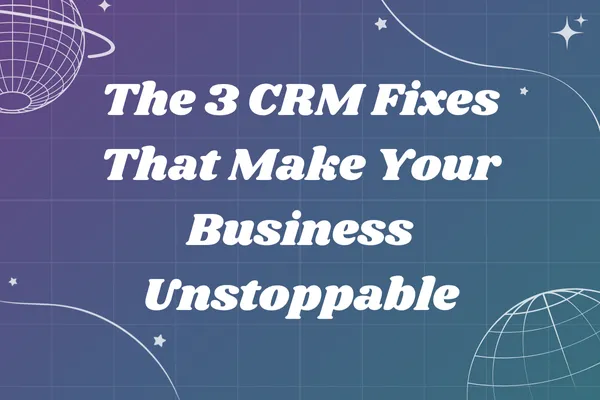
The 3 CRM Fixes That Make Your Business Unstoppable
I recently connected with a new networking partner who shared a quote that instantly resonated with me, one I hadn’t heard before but immediately recognized as truth. W. Edwards Deming said, “94% of problems are systems-based.”
That one line confirmed something I’ve long believed: when systems are strong, businesses thrive. When they’re weak or missing, even the best intentions fall short. It also reminded me how aligned I am with others who value systems as the foundation for sustainable success and inspired me to write this article.
James Clear echoed Deming’s wisdom decades later: “You don’t rise to the level of your goals. You fall to the level of your systems.”
Two different eras. Same insight. And if you’re a business owner still treating your CRM like a glorified address book, it’s time to upgrade your mindset.
🧠 Systems Solve Problems, People Just Get Blamed for Them
Deming’s quote isn’t a jab at people, it’s a wake-up call for leaders. Most business breakdowns aren’t about lazy employees or bad luck. They’re about missing systems: no follow-up process, no engagement tracking, no clarity on who’s doing what, when, or why.
That’s where a CRM (Customer Relationship Management system) comes in. Not as a tool you “should probably use more,” but as the system that quietly powers your business’s growth, retention, and reputation.
🚀 The Top 3 Problems a CRM Solves (When Used Properly)
Let’s break it down because when you leverage your CRM intentionally, here’s what happens:
1. Lost Leads Become Loyal Clients
Without a CRM, leads slip through the cracks. You forget who asked for a proposal, who ghosted you, and who’s ready to buy.
With a CRM: You track every interaction, set reminders, and follow up with confidence. You stop relying on memory and start relying on momentum.
2. Engagement Becomes Measurable (and Rewardable)
You know who’s opening your emails, clicking your links, and replying to your messages.
With that data, you can reward responsiveness, nurture relationships, and prioritize the people who are showing up.
It’s not just about outreach, it’s about insight.
3. Your Team Stops Guessing
A CRM creates clarity. Everyone knows where a client stands, what’s been promised, and what’s next.
No more “Did you send that contract?” or “Who’s following up with her?”
Your CRM becomes the single source of truth—and your team becomes unstoppable.
🔁 Systems > Goals (Every Time)
James Clear nailed it: “You don’t rise to your goals. You fall to your systems.”
Goals are great. But without systems, they’re just wishful thinking.
Your CRM is the system that turns goals into reality.
Want better retention? Track engagement.
Want more referrals? Document your wins.
Want to scale? Automate your workflows.
💡 The Shift That Changes Everything
When my clients stop treating their CRM like a contact list and start using it as a relationship engine, everything changes.
They build trust faster. They follow up smarter. They close more deals with less stress.
And they finally feel like they’re running their business, not just reacting to it.
✨ Final Thought: Your CRM Reflects Your Standards
If you want to raise your standards, start with your systems.
Because as Deming and Clear both remind us:
Success isn’t about trying harder, it’s about designing smarter.
